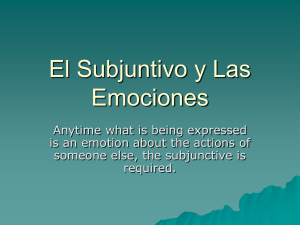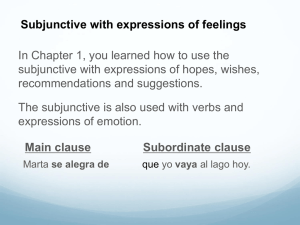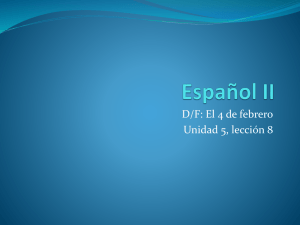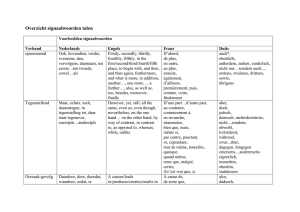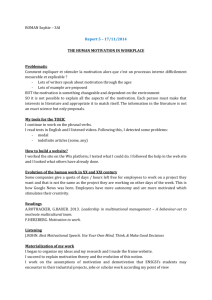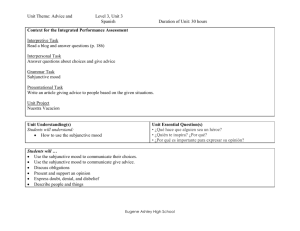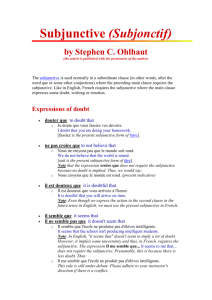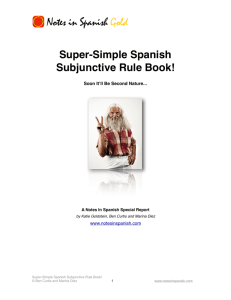Top Ten Translation Traps
advertisement
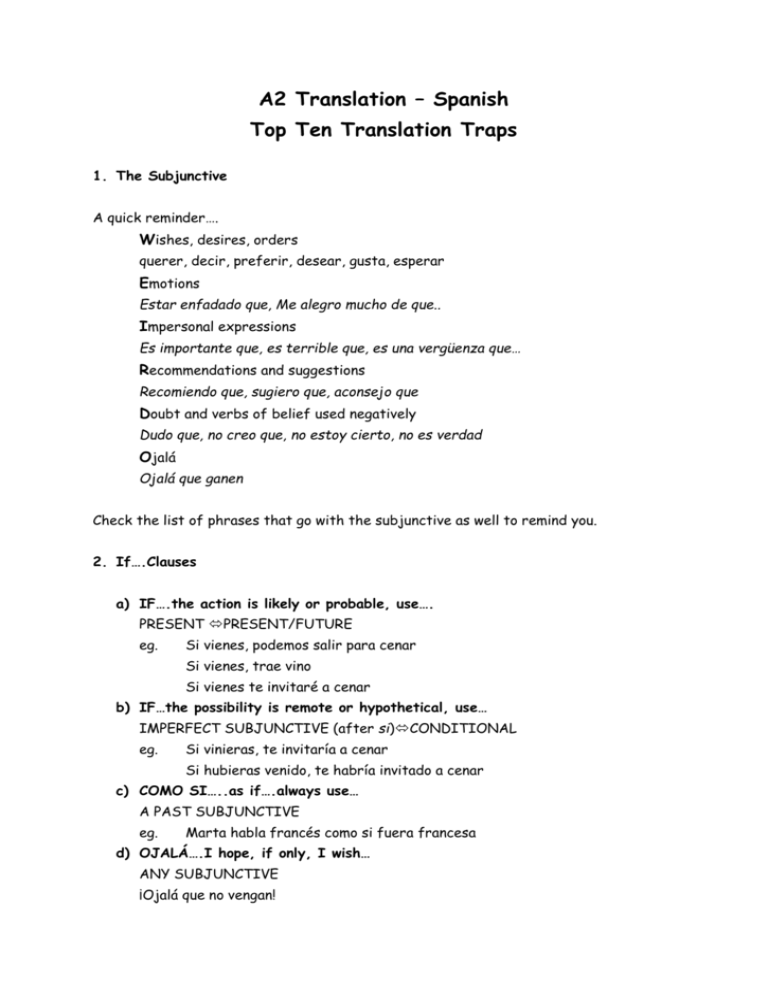
A2 Translation – Spanish Top Ten Translation Traps 1. The Subjunctive A quick reminder…. Wishes, desires, orders querer, decir, preferir, desear, gusta, esperar Emotions Estar enfadado que, Me alegro mucho de que.. Impersonal expressions Es importante que, es terrible que, es una vergüenza que… Recommendations and suggestions Recomiendo que, sugiero que, aconsejo que Doubt and verbs of belief used negatively Dudo que, no creo que, no estoy cierto, no es verdad Ojalá Ojalá que ganen Check the list of phrases that go with the subjunctive as well to remind you. 2. If….Clauses a) IF….the action is likely or probable, use…. PRESENT PRESENT/FUTURE eg. Si vienes, podemos salir para cenar Si vienes, trae vino Si vienes te invitaré a cenar b) IF…the possibility is remote or hypothetical, use… IMPERFECT SUBJUNCTIVE (after si)CONDITIONAL eg. Si vinieras, te invitaría a cenar Si hubieras venido, te habría invitado a cenar c) COMO SI…..as if….always use… A PAST SUBJUNCTIVE eg. Marta habla francés como si fuera francesa d) OJALÁ….I hope, if only, I wish… ANY SUBJUNCTIVE ¡Ojalá que no vengan! 3. Ser & Estar SER – Use DOCTOR to remind you when to use it ESTAR – Use SELF to remind you when to use it D escription (Ella es alta) O ccupation (Soy profesora) S tate (La puerta está abierta) C haracteristic (El es simpático) E motion (Estoy contento) T ime/Date (Son las ocho, hoy es el L ocation (Estoy en clase) F eeling (Estoy aburrido) ocho de julio) O rigin (Soy de Londres) R elationship (Ella es mi madre) If you can’t remember which is which, this might help: “How you feel and where you are that is when you use estar!” 4. El ‘a’ personal In Spanish, when people are the direct objects of verbs we need to put an ‘a’ in front of them. (Direct objects are nouns that are affected directly by verbs, in other words, they receive the action of the verb. Direct objects can be things or people, but we only use the ‘a’ with people.) eg. Veo a Juan los lunes Visitamos a nuestros abuelos We do not use the personal ‘a’ with things, places or actions or when you are referring to an indefinite person (you don't know if such a person exists) or an unspecific person. eg. Ana quiere un novio inteligente. Ana hasn't met this intelligent boyfriend yet; but that is the type of boyfriend she wants. The use of the Indefinite Article un is a clue not to use the Personal a. If Ana knows the intelligent boyfriend of Susana, we would say, Ana conoce al novio inteligente de Susana People Busco al dependiente. Miro al primo de Mauricio. Things: no Personal “a” here! I'm looking for the sales clerk. I'm looking at Maurice's cousin. Busco el bolígrafo de mi hermana. I'm looking for my sister's pen. I'm watching the Animal Planet program. Miro el programa de Animal Planet. 5. HACER in expressions of time Hacer can be found in many idiomatic phrases, especially in those to do with time. Note that the word order is variable for many of these expressions. a) hace + time + que + preterite or preterite + hace + time b) hace + time + que + present or present + hace + time c) present + desde hace + time d) hacía + time + que + imperfect or imperfect + hacía + que e) imperfect + desde hacía + time 6. Spanish Pronouns Direct Indirect object object Yo me Tú Subject Possessive Reflexive Prepositional Reciprocal me mi me mí - te te tu te ti - Él lo le su se él - Ella la le su se ella - Usted lo, la le su se usted - Nosotros nos nos nuestro nos nosotros nos Ellos los les su se ellos se Ellas las les su se ellas se Ustedes los, las les su se ustedes se Remember that with Double Object pronouns, the Indirect Object pronouns le and les change to se when combined with the Direct Object pronouns lo, la, los, and las. Remember that the Possessive pronouns need to agree in number with the possessed object; and in the case of the Nosotros form, the pronouns must agree in gender as well. 7. Conjunctions a) Y meaning ‘and’ changes to E before I and HI (but not HIE) b) O meaning ‘or’ changes to U before O or HO. c) SINO meaning ‘but’: after a negative, sino introduces a contradiction.* *sino que = verb eg. no habla sino que grita = he doesn’t talk, but shouts. 8. Passive Voice A passive voice is where an action described by the verb is being done to the subject BY someone else (the agent). The passive has two parts in Spanish SER + PAST PARTICIPLE The past participle has to agree with the subject, not the agent in gender and number, just like adjectives. The passive can be in all tenses and moods by conjugating SER into that tense or mood. Alternatives to the Passive Voice Use the reflexive SE eg. se sabe la verdad Use ‘todo el mundo’, ‘nadie’ or ‘la gente’ eg. La gente sabe la verdad. 9. GUSTAR and similar verbs If the subject is singular use GUSTA, if it is plural use GUSTAN. The indirect pronoun is NOT the subject of the sentence. Similar verbs include: aburrir, bastar, caer bien, dar asco, doler, encantar, quedar, volver loco, importer etc. In order to clarify further the indirect object the sentence can begin with a prepositional phrase. eg. A él le gusta la silla, A María le gusta la silla. 10. Apocope (Shortened adjective forms) There are several adjectives that shorten when they go before certain nouns. The most common: In front of masculine nouns alguno/algún Santo/San (only for masculine bueno/buen Saints) malo/mal In front of masculine and feminine ninguno/ningún nouns primero/primer grande/gran uno/un cualquiera/cualquier


